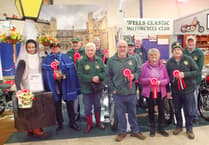RESIDENTS are being asked to have their say on Bath and North East Somerset Council’s plans to build 16 homes for people with autism and learning difficulties on Bath’s “tufa field” .
The council says the homes will be “life-changing,” allowing people to live independently but with appropriate care and support in their own homes, reducing the need for out-of-area placements away from family and friends. There is currently a shortage of supported living in the council area, and the council says that the housing scheme in the field will provide a “soothing and tranquil setting” while protecting the landscape.
But many locals have urged the council not to build on the field on Englishcombe Lane in Bath. The site is ecologically and geologically significant due to its limestone blushes where rare limestone formations called tufa form.
Deborah Collins, council cabinet project lead for built environment and sustainable development, said: “We have worked hard to develop a scheme that provides residential accommodation in a sensitive way while protecting the landscape. I am immensely proud of this scheme and I believe it will have a transformative effect on people’s lives.”
The “low density” homes will be built in two clusters on each side of the field, with a “forest garden” in the middle around the flushes, with a decked walkway crossing it. The housing will include both one, two, and three-bedroom homes with sheltered seating at the front alongside a communal facility.
The development includes 11 single-storey and five split-level homes. The buildings will have “green roofs,” with internal spaces designed with resident’s comfort in mind, with controlled lighting and “comfortable micro-climates.”
The council says the proposals have been designed to protect the ecology of the site, with a 10 metre buffer around the suite, a bat corridor, and protective measures for badgers, reptiles, and small mammals.
A face-to-face drop-in session on the plans will be held at at St Luke’s Church Centre off Wellsway on Wednesday, March 13 between 4pm and 8pm, for people to see the plans, ask questions, and give feedback. The plans can also be seen online until March 22 here: https://englishcombelanesupportedhousing.com/
Ms Collins added: “Feedback from previous engagement activity has fed into these proposals and I want to thank everybody who has worked with us to develop this scheme.”
A planning application will be submitted at the end of March. If approved in the summer, work could start on the site in late 2024.




